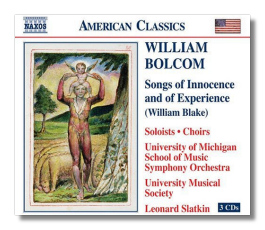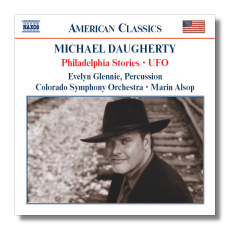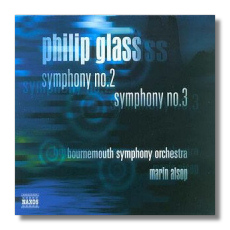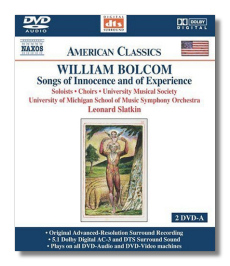
The Internet's Premier Classical Music Source
Related Links
-
Bolcom Reviews
Daugherty Reviews
Glass Reviews - Latest Reviews
- More Reviews
-
By Composer
-
Collections
DVD & Blu-ray
Books
Concert Reviews
Articles/Interviews
Software
Audio
Search Amazon
Recommended Links
Site News
 CD Review
CD Review
American Classics

William Bolcom
Songs of Innocence and of Experience
- Christine Brewer, soprano
- Measha Brueggergosman, soprano
- Ilana Davidson, soprano
- Nmon Ford, baritone
- Nathan Lee Graham, narrator & vocals
- Linda Hohenfeld, soprano
- Jeremy Kittel, fiddle
- Tommy Morgan, harmonica
- Joan Morris, mezzo-soprano
- Carmen Pelton, soprano
- Peter Ruth, harmonica & vocals
- Marietta Simpson, mezzo-soprano
- Thomas Young, tenor
Michigan State University Children's Choir
Michigan University Choir & Chamber Choir
Michigan University Musical Society Choral Union
Michigan University Orpheus Singers
Contemporary Directions Ensemble
Michigan University Symphony Orchestra/Leonard Slatkin
Naxos 8.559216-18 3CDs
Also released on 2DVD-A Discs 5.110083-84 Amazon - UK - Germany - Canada - France - Japan - ArkivMusic - CD Universe - JPC


Michael Daugherty
- Philadelphia Stories
- UFO *
* Evelyn Glennie, percussion
Colorado Symphony Orchestra/Marin Alsop
Naxos 8.559165
Here are three important releases of works by prominent American composers appearing in the Naxos American Classics series. The most ambitious of the trio, of course, is the three-CD set of songs by William Bolcom. The songs are settings of William Blake's poems, also entitled Songs of Innocence and of Experience. Bolcom composed most of them in the periods 1973-74 and 1979-82, though some date back to 1956 and 1966. They are written in a variety of styles, from the down-home folksiness of The Shepherd to the dark and creepy Infant Sorrow, to the Negro Spiritual-inspired The Little Black Boy, to the child-like character of the Nurse's Song, to the holiday-season-like Holy Thursday, to the rhythmic, chant-like obsession of The Tyger, and to the austere mood of the orchestral interlude preceding The Chimney Sweeper.
Not surprisingly, the music depicting the wide range of moods in these works prompts one to declare, as Mahler famously did in explaining the character of his symphonies, that a whole world exists here. Bolcom's music is, from one song (or instrumental number) to the next, colorful, brash, dreamy, light, sassy, catchy, overwrought, ethereal, folksy, soothing and sometimes several of these things at once. It consistently captures the spirit of the Blake texts, and the instrumental writing is brilliant. As a collection, this is obviously an unwieldy kind of thing, not the sort of fare you'll encounter in a single concert, or even in a series of concerts. This may well be its only complete appearance ever on recording. Nevertheless, it is comprised of mostly inspired songs, even if some listeners might view them as generally old-fashioned or unadventurous in their expressive language.
The performances are excellent and feature fine choral work by the various amateur ensembles from Michigan. Several of the soloists turn in notable work here too, including the now-rising star, Measha Brueggergosman, and the veteran mezzo (and wife of the composer), Joan Morris – try her delicious rendition of The Little Vagabond. Leonard Slatkin presides over the project with an incisive baton, and Naxos provides fine sound and notes. To those interested in American music and song, this collection is indispensable.
Also indispensable is the Glass disc containing the composer's Second and Third Symphonies. I may marginally prefer the Third – scored for strings only – though both works, written about a year apart, in the period 1993-94, are compelling efforts that exhibit Glass's trademark style – haunting, typically obsessive thematic and rhythmic repetitions, coupled with a sense of confinement within a dark and ethereal but often soothing world. Sometimes that world is bright, however, as in the finale of the Second, wherein the mood is celebratory, the writing colorful, and the effect exhilarating.
Though the Third is the shorter of the two works, lasting about twenty-four minutes, slightly over half the length of its sibling here, it is cast in four movements compared with the Second's three. As suggested above, both symphonies are predominantly dark in mood, but both are transparently scored, imparting a certain lightness of expression, in the end coming across as music that many listeners can grasp at first or second hearing. Marin Alsop draws fine performances from her Bournemouth forces and Naxos provides excellent sound.
Alsop also proves a fine advocate with her former orchestra, the Colorado Symphony, in the music of Michael Daugherty. But I'm a bit less enthusiastic about the offerings here. Not that this generally light fare lacks appeal or craftsmanship – the scoring is colorful, the shift of moods – especially in UFO – deftly imagined, and the rhythms and themes are often catchy. Still, these effects-laden and percussion-spiced works offer perhaps a bit too much tasty dessert, but if that's your preference, have at it. If you lean toward meat and potatoes, however, you may find this a slight disappointment. That said, Evelyn Glennie's performance in UFO is astonishing and ought to be heard by students of percussion and by those listeners who want to hear the Buddy Rich of classical percussionists. I should add that I found Philadelphia Stories the better work, with its closing movement (of three), Bells for Stokowski (yes, Leopold), quite compelling and offering more than just dessert for the listener.
By the way, I can't help but observing that the main theme in the finale of UFO bears a strong resemblance to the famous Mission Impossible theme by Lalo Schifrin. Was it meant as a tribute to him, in a work about UFOs, their landings and mystique? Whatever the case, Daughterty offers colorful works here, even if I have expressed some reservations about them, and Naxos provides fine sound.
Copyright © 2005, Robert Cummings























